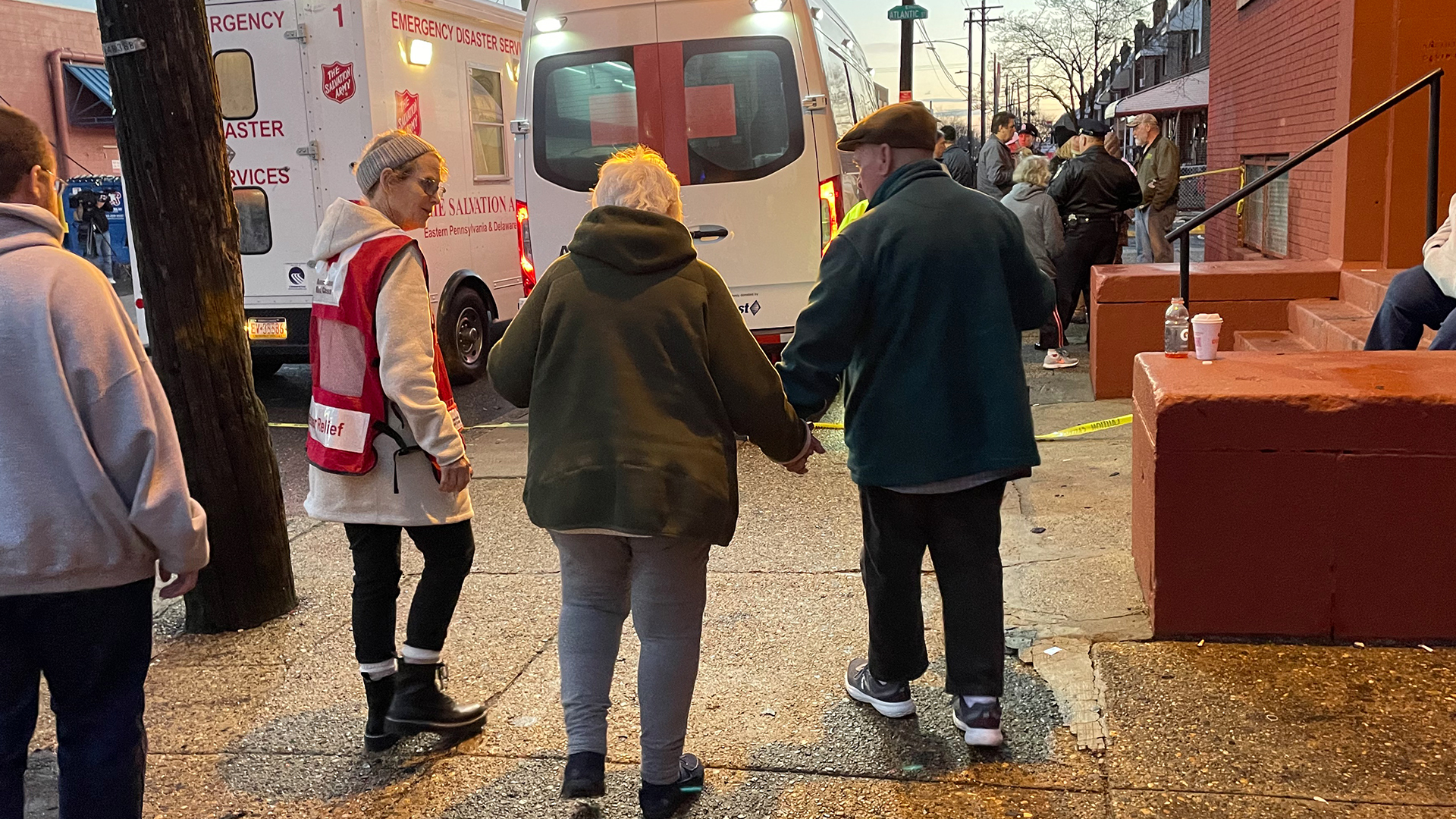
Randy Miller walks with a couple impacted by a home explosion in the Port Richmond section of Philadelphia on Jan. 1, 2023. Submitted photo
From a single-family home fire to widespread destruction caused by a natural disaster, American Red Cross volunteers are there when families need them most. But holistic disaster recovery is more than blankets, cots and meals.
“The thing that is often most helpful is just being present, being a good listener and allowing people to share their story,” said Randy Miller, Disaster Mental Health lead for the Red Cross Southeastern Pennsylvania Region.
That presence can be a powerful first step in helping someone begin to heal after a traumatic event.
“When we are present for someone in the immediate period after a disaster, we’re offering relief and release. People can talk about what happened and start to process it and think about their priorities and first steps,” she explained.
Randy is a retired psychiatric nurse and a certified grief and loss educator. Like her, all members of her team are licensed professionals. But their role with the Red Cross is to provide support strategies, not therapy.
“We talk about resilience, and if they’re still struggling after those few initial calls, we will refer them to support in their community,” she said.
Building toward recovery often starts with a simple but powerful tool: psychological first aid.
“It’s all about the first 24 to 48 hours after a disaster," she said.
According to the the Psychological First Aid Field Operations Guide, the approach reduces the initial distress caused by traumatic events and fosters both short- and long-term coping strategies. Ready.org summarizes its core principles as “listen, protect and connect,” focusing on establishing safety and comfort, making human connections, providing calm and hope and enhancing self-efficacy.
Every Red Cross disaster responder is required to complete a four-hour Psychological First Aid course, for which Randy is one of the instructors.
She stressed that being a good listener in the immediate aftermath of a disaster is an important first step in connecting someone with the right resources and helping them build strategies.
“It’s asking someone, ‘what is the most important thing to them today?’ Because we might think it’s one thing when it’s totally something else,” she said.
For those who survive a disaster, Randy shares this advice: identify people in your life who can be present for you.
“A lot of times, people are afraid to ask for help. It can really be a challenge, but it’s a big thing to be able to ask for help and know that people and organizations will be there for you,” she said.
Randy encourages everyone to check out FindHelp.org, a free tool that her team uses to connect survivors with community resources. You can filter resources by distance, insurance, language and more.
Every day, Red Cross volunteers like Randy bring comfort, hope and healing to people facing their darkest moments. If you’re looking for a meaningful way to give back, consider joining the Red Cross as a volunteer. No matter your background or experience, there’s a place for you on our team. Get started at redcross.org/volunteer.
World Mental Health Day
October 10th is World Mental Health Day – a powerful reminder that there is no health without mental health. This year’s theme, “Access to services: Mental health in catastrophes and emergencies,” focuses on the urgent need to support the mental health of people affected by humanitarian emergencies. The theme reflects the heart of the Red Cross mission.
According to the World Health Organization, crises such as natural disasters, conflicts and public health emergencies can cause significant emotional distress—leading one in five survivors to experience a mental health condition. Supporting the mental well-being of those affected by humanitarian emergencies isn’t just important—it can save lives. It gives people the strength to cope, the space to heal and the foundation to recover and rebuild their communities.Visit wmhdofficial.com to learn more.
- Written by Alana Mauger
Support all the urgent humanitarian needs of the American Red Cross.
Find a drive and schedule a blood donation appointment today.
Your time and talent can make a real difference in people’s lives. Discover the role that's right for you and join us today!